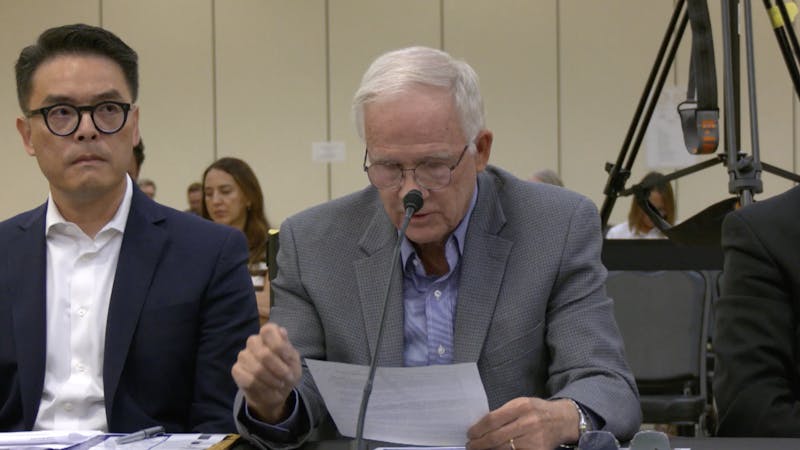Rice reaffirms support for international students after Trump administration targets Harvard
Rice and the Office of International Students and Scholars said in a May 23 email that they are monitoring the Trump administration’s actions towards Harvard to bar the school from enrolling international students. A federal judge temporarily halted the move less than 24 hours later.
The Department of Homeland Security moved to terminate Harvard’s access to the Student and Exchange Visitor System, which is used to maintain information about international students May 22. This would end Harvard’s permission to host international students. The Trump administration recently asked Harvard to provide extensive data on international students, which the university partially complied with.
DHS previously said that SEVIS registration has been restored for individuals who have not had their visas revoked. The DHS said that they have not reversed any actual visa revocations, and still have the authority to terminate status for other reasons.
All of the five Rice community members whose statuses were terminated are among those whose records will be restored, said Rice officials in an April 28 email. International students make up 14% of the Rice class of 2028.
A SEVIS termination means students lose all employment authorization and cannot re-enter the US, which also applies to the dependents of graduate students on associated F-2 or M-2 visas.
A SEVIS termination is not the same as a visa revocation. The Trump administration’s officials said in April that solely SEVIS terminations, which are the vast majority of cases, do not impact a student’s non-immigrant status or equate to a visa revocation on their own.
While Immigrations and Customs Enforcement develops a new framework to review international student visas, no students will have their records terminated from the SEVIS federal database based on criminal history.
A review from the American Immigration Lawyers Association of over 300 recent cases of visa revocations and SEVIS terminations said that only two of the affected students had ever reported any history of political protests.
Many of the students had prior interactions with law enforcement, such as minor traffic violations or instances of theft.
Rice officials said in an April 22 email that the university remains deeply committed to supporting the international community and providing lawful assistance to those navigating visa-related challenges.
Erica Augenstein, Rice Grad Campaign president, said they wanted to emphasize that Rice’s overall response is indicative of a culture of compliance with authoritarianism. She said that Rice has continually responded to the visa challenges by encouraging students with SEVIS terminations to leave the country.
“Rice has yet again demonstrated that it will sacrifice our community members for any sense of institutional safety,” Augenstein said in a message to the Thresher. “We know that students with SEVIS terminations have had to take on debt for thousands of dollars of legal fees as well as living expenses during their time without stipend payment.”
No students have been asked or encouraged by Rice administrators to leave the country, a Rice spokesperson said in an email to the Thresher.
The Rice chapter of the American Association of University Professors said that they are asking Rice administration to confirm the number of students affected, the reasons for their terminations of status or visa revocation, their countries of origin and their fields of study. Both Rice AAUP and Rice Grad Campaign are asking for financial support for affected students.
“We received word last night from immigration attorneys we work with that about 50% of all status terminations in the past few weeks had been reinstated,” Kamala Visweswaran, Rice AAUP president, wrote in an email to the Thresher.
Visweswaran said this is likely due to judges across 23 states, including at least four in Texas, issuing temporary restraining orders that block the government’s actions.
“We are asking Rice to provide all affected students with financial and legal assistance, including filing [temporary restraining orders],” Visweswaran wrote. “Students cannot afford to take out loans to fight their cases in court, and Rice should stand by its students and provide full financial support.”
[6/4/2025 7:20 p.m.: A previous version of this article said it was unclear if any students had been asked to leave the country by Rice administrators. This article has been corrected.]
More from The Rice Thresher

Rice announces Chao College as 12th residential college
Rice announced that the 12th residential college will be named Ting Tsung and Wei Fong Chao College Aug. 19. The college, set to open in fall 2026, will contain nearly 300 on-campus beds.
Dining access fund announced following on-campus unlimited meal swipes
Rice announced new food assistance programs on Tuesday to account for the controversial change in the on-campus meal swipe plan.

Rice disaster prediction model discussed at hearing on deadly Central Texas floods
The House and Senate Select Committees on Disaster Preparedness and Flooding held a hearing on July 31 in Kerrville to address the deadly July 4 flooding in Central Texas. The flooding along the banks of the Guadalupe River killed 108 people, including 37 children. In the charged hearing, Texas lawmakers and flood survivors criticized the local response to the disaster.


Please note All comments are eligible for publication by The Rice Thresher.